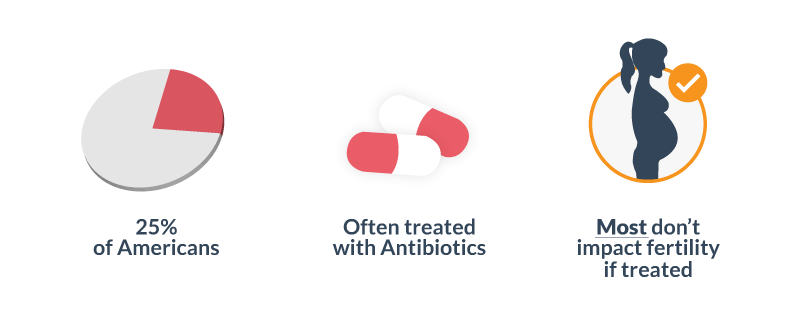No one wants an STD (Sexually Transmitted Disease), also know as STI (Sexually Transmitted Infection), but anyone who is sexually active is at risk of getting one. Although there is a certain and distinct social stigma that comes along with a dignosis of an STD, it is not a reason to be ashamed.
More people are diagnosed with sexually transmitted diseases than you probably know. In fact, 1 in 4 Americans has had an STD of some sort in their lifetime.
In most cases, STDS are easily treated, often with a course of antibiotics, and will not have an impact on your fertility now or in the future.

Some STDs do have the ability to impact fertility (more on this later), but their chances of doing so are usually reduced or eliminated when the affected person seeks treatment in a timely manner.
Chlamydia and your chances of getting pregnant
If you have chlamydia now or in the past, you are not alone. Chlamydia is the most common sexually transmitted infection that is spread in the Western world. In 2013, the Centre for Disease Control and Prevention estimated there were 2.86 million cases of chlamydia in the USA.
Why is it so common? Well, up to 75% of all women and 50% of all men who contract chlamydia do not have symptoms, so it is often passed from partner to partner unknowingly. If left untreated, chlamydia can lead to fertility issues for both men and women.
Causes of chlamydia
Chlamydia trachomatis is a tiny parasitic bacterium that acts much like a virus in that it requires the biochemical mechanisms of another cell in order for it to spread.
It is most often spread by sexual contact. You can contract chlamydia by having unprotected vaginal, anal or oral sex with someone who is infected, and you are more likely to get chlamydia if you have multiple sexual partners.
It is important to note that you can contract chlamydia from an infected male even if he does not ejaculate.
If you have had chlamydia in the past, you are not immune.
If you are pregnant, not only can chlamydia lead to premature labour and low birth weight, you can also pass the infection onto your baby during childbirth, which can lead them to develop eye and lung infections.
Symptoms
As mentioned above, chlamydia often comes without any symptoms at all, so it is important to get tested regularly, especially when you have had multiple sexual partners (and this also includes going from one monogamous relationship to another). When chlamydia does present symptoms, for men these include burning during urination, discharge from the penis or rectum, and tenderness or pain in the testicles. For women, symptoms include painful intercourse, vaginal discharge or bleeding after intercourse.
Treatment
Chlamydia is easily treatable; however, it can lead to infertility if it is left untreated. As part of a pelvic exam for a woman, the doctor will take a culture to test for the bacterium.
For a man, the doctor will take a culture from the tip of the penis or from the rectum.
If you test positive for chlamydia, you will likely be given a course of antibiotics to clear the infection.
It is crucial for your partner to be tested and treated also to prevent re-infection.
Your doctor will likely schedule a follow-up exam in about a month to ensure that the infection has cleared and you are chlamydia free.
Treatment is easy and effective, but it must be done in a timely manner to prevent the infection from spreading.
Chlamydia and fertility
If you have had and treated chlamydia in the past, it should not affect your chances of conceiving. These infections only become problematic to fertility when they are left untreated.
Chlamydia is a preventable cause of pelvic inflammatory disease (PID), which effects around 10-15% of women who contract the infection.
Untreated chlamydia can spread to the uterus and fallopian tubes, causing Pelvic Inflammatory Disease (PID). Left untreated, PID can cause irreversible damage to a woman's reproductive organs, and permanently affect her ability to conceive.
In men, untreated chlamydia can disrupt sperm function and can also lead to male infertility. Untreated chlamydia in men can cause an infection in the urethra, a painful condition called epididymitis that can lead to inflammation of the rectum, and ultimately, infertility.
It can also cause ectopic pregnancy, which is when the embryo implants outside of the uterus. Ectopic pregnancy is extremely dangerous and can even be life-threatening to the mother.
If you find out that you are pregnant with chlamydia, it is crucial to seek treatment immediately as you can pass the infection on to your unborn baby. It may also result in pre-term labor.
Gonorrhea and fertility
Gonorrhea is another very common STD that can have an impact on fertility if left untreated. It can cause infections in the genitals, rectum and throat.
Gonorrhoea affects more people than you might think. In fact, in 2013 the Centre for Disease Control and Prevention received reports of 333,004 cases of gonorrhea in the USA alone. When accounting for those cases that go unreported, the number is likely to be much higher.
Gonorrhea is transmitted through contact with body fluid including blood, semen, and vaginal, throat or rectum discharge during unprotected vaginal, oral or anal sex with someone who carries the infection.
While the likelihood of contracting gonorrhea increases with the number of sexual partners you have, if caught early, it can be easily treated. In fact, fertility issues are experienced only when the infection is left untreated, so make sure you have regular STI screenings to keep your fertility health in check.
Causes of gonorrhea
Gonorrhea is caused by a bacterium called Neisseria gonorrhea. What makes this sexually transmitted infection stand out above many others is that it can survive in many places outside of the reproductive organs.
Gonorrhea can survive in the eye, rectum, throat, mouth, penis or vagina. This means that it can be transmitted through any type of sexual contact - not just standard intercourse. A mother can even transmit this infection to her newborn.
Symptoms
One of the reasons that gonorrhea may be so widespread is because those who are infected may not even know they have the infection. Not everyone experiences symptoms, and when there are obvious symptoms, they do not occur until two to 30 days after exposure.
Symptoms are different for men and women. Women with gonorrhea may experience greenish yellow or whitish discharge, lower abdominal or pelvic pain, burning when urinating, pink eye, spotting or bleeding between periods, swelling of the vulva and swollen glands in the throat.
Men also experience the same greenish yellow or whitish discharge, burning when urinating and swollen glands, but they may also experience painful or swollen testicles and cause a painful condition in the tubes attached to the testicles.
Treatment
Now that we have covered the scary part of this infection, here is the good news about gonorrhea: It can easily be treated with a course of antibiotics that can be given orally or by injection. However, it is important that both you and your partner are treated in order to prevent reinfection.
While treatment is relatively easy and painless, but before you can be treated, you must be diagnosed. Remember that many people do not experience symptoms, so it is important that you are tested regularly, especially if you have different sexual partners or have had unprotected sex.
Much like with untreated chlamydia, untreated gonorrhoea in women can also lead to PID. PID can cause scar tissue that may block the fallopian tubes, cause ectopic pregnancy and/or infertility.
In rare cases, untreated gonorrhea may also cause a man to become infertile. In very rare cases, untreated gonorrhea can spread to your blood and joints.
Can I conceive with gonorrhoea?
The dangers of a gonorrheal infection leading to infertility come from previous infections that were left untreated. In women, if gonorrhea is left untreated, it can lead to pelvic inflammatory disease which may cause damage to the fallopian tubes and possibly lead to infertility. It may also increase your odds of having an ectopic pregnancy, which occurs when implantation takes place outside of the uterus. In men, untreated gonorrhea can lead to a painful condition called epididymitis, where the tube at the back of the testicles becomes inflamed and can lead to infertility.
If you have recently contracted gonorrhea and are trying to conceive, you should not have any issues. However, it is very important that the infection is treated right away so you do not pass it on to your child during delivery.
Don't be afraid to get treatment
An estimated 2.86 million cases of chlamydia and 333 thousand cases of gonorrhea are diagnosed each year in the United States, so if you do find out that you have one of these STDs, know that you are not alone. These common infections are nothing to be ashamed of, and you should never let embarrassment stand in the way of treatment.







